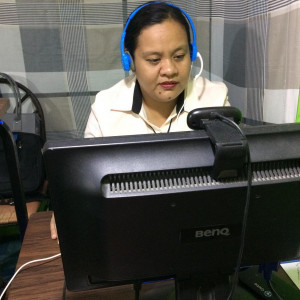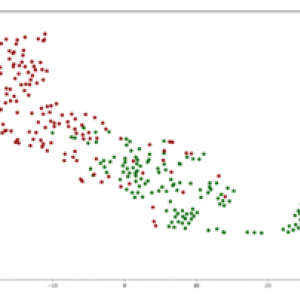What's your typical work routine?
Interview with Hannah, a freelance writer that travels the world
Some people love routines, but I’m not one of them.
For many remote jobs you are expected to work standard days and hours. With a lot of remote jobs, the only difference is the location. That’s not what I enjoy or what I do.
I love to have my days varied and flexible. That means my day might start with social media work, writing, or something completely unrelated to work. This isn’t a good fit for everybody, but it works well for me. I’ve had to develop a lot of discipline for this because it can be easy to not accomplish much with this method.
I guess when I started freelancing part time and still had an in-person job, there was some flexibility built in from the beginning because there was less freelance work to do.
Something that helps me are time-tracking tools. They let me make sure I’m getting all the necessary hours in for my full-time job and allow me to see where the rest of my time is going. While I’m not a big scheduler, I am a fan of to-do lists and these help me remember everything I need to accomplish. I personally like bigger lists that have both work tasks and other life priorities.
At the beginning of this year, I worked as I traveled abroad in Southeast Asia. I’m now visiting my family in the United States for a bit and am deciding where to head next (thinking Singapore or Thailand).
Hannah is a freelancer writer and social media manager that travels the world while working remotely. Read her interview to learn how she works.
Read full interview from Interview with Hannah, a freelance writer that travels the world.
Interview with Bennah, a remote ESL teacher that teaches kids English all over the world
My typical work routine is that every day I turn on my desktop computer when I arrive home from my morning work.
I usually arrive home at 5:05 pm Philippine Time, and my shift for my online classes would be from 5:30 pm onwards since it is really unpredictable that the administrators online will put classes at any time from 5:30 pm onwards.
Though I have my regular students, sometimes they will put students for demo classes on the times that I am vacant. So I need to remain online during those times. But on the weekends, I have my Saturday break and will have the class on Sundays from 9:30 am till evening.
When I started my classes, I started it with greetings of “good evening” or “good morning”. I would ask them if they have eaten their dinner or breakfast and how do they feel about their day. So after asking them several personal questions, I would ask them if they are ready for the lesson and so we begin with the books that they use.
We use PDF books that the company provides and will discuss it until we finish the time given which is 50 minutes per student. Before we end the class, I would ask the student again if he/she did understand the lesson, or if he/she have something to ask before we say good bye. If they say none, I do say good bye and will see again the student on the next class that we will be having.
Bennah is an ESL (English as a Second Language) Teacher who teaches students from all around the world while working from home.
Read full interview from Interview with Bennah, a remote ESL teacher that teaches kids English all over the world.
Interview with Deb, a sales copywriter who transitioned from software development
My work routine is usually dictated by my clients. The majority of my clients are from the US, the UK, Europe, and Australia. So, time zone differences can be a bit of a challenge at times. If it is an Australian client, then I usually wake up early to attend phone calls and slack/Skype chat sessions. If it is a client from the US, then late nights are the norm.
However, I do try to follow a specific routine to help me get through the day (and night!):
- Wake up around 6 AM and go for a 30 minute morning walk
- Do freehand exercises for 30 minutes
- Check my emails and Slack channels for anything urgent that needs to be actioned.
- Have a look at my schedule (which I write on the earlier night before going to sleep).
- If I have any early morning chats or calls, then I action them.
- Hit the keyboard for a 2-3 hour stretch of writing.
- Break for lunch around 1:00 PM my time
- Write some more from 2:00 PM to 5:00 PM
- Take a break for an hour where I go out of the house to get some fresh air.
- Write some more from 6:30 PM to 9:30 PM
- Break for 30 minutes for dinner.
- Do some light web browsing to catch up for what’s been happening in the world
- Try to hit the bed by 11:00 PM
The above routine is what I follow on an ideal day. However, in the event of client requests for a call or a Skype chat, I obviously must be flexible. There were instances during the early days of my career when I used to go to sleep at 2:00 AM my time to attend client phone calls. However, over the last year or so, I’ve put my foot down and told my clients that I will not be available from midnight my time to 6 AM my time, unless there is a dire emergency.
Most of my clients have been very understanding and have been more than willing to accommodate my request for an alternate time for a phone call.
Deb made the jump from full-time software developer to freelance sales copywriter—learn how he made the transition.
Read full interview from Interview with Deb, a sales copywriter who transitioned from software development.
Interview with Henry, a consultant who found remote work by saying No
I wake up at 5 AM. I wouldn't really consider myself an early bird, but my daughters (one toddler, one baby) have backed me into a time-corner. I wake up before them to work for about an hour, then help out with breakfast.
I'll go back to work around 7 AM and work until the girls wake up from their afternoon naps around 3:30. It's a great program, that only work-from-home could allow.
I get all the work time I need, save on time without a commute, and spend quality time with my kids.
Sometimes a "no" can lead to an exceptional opportunity. For Henry, that answer led to an ideal remote work career. In this interview, Henry shares his remote work tool stack, and essential tip for remote employees and managers.
Read full interview from Interview with Henry, a consultant who found remote work by saying No.
Interview with Hanling, a data scientist that works remotely on machine learning
Since at the moment I'm a master student, I can work remotely only part-time.
Most of my contracts are short-time (completed within one week). So I have to keep on finding new jobs (recently I'm quite free).
I would review the new job posts on Upwork frequently and apply using my fragment time. Typically I'll do the work in the evenings of my timezone (if it is not urgent) and also two whole days in weekends (if I'm free).
Hanling started working remotely as a student and now does freelance machine learning and data analysis for clients all around the world.
Read full interview from Interview with Hanling, a data scientist that works remotely on machine learning.
Interview with Erin, a virtual assistant with a successful approach to freelancing
My routine varies somewhat depending on where I'm working from. Since my wife and I both work online, we opted to take our "show on the road" in 2014. We have been working while traveling around the world ever since.
I purposely ensure that my clients are all located on the west coast (PST) in the US. By keeping everyone in the same area code, I'm able to guarantee my clients that I'll be available during their working hours, regardless of where in the world I'm working from.
Having said that, I always begin each day the same way: with a cup of coffee in bed while I read my favorite blogs or skim social media. I also end each day the same way: A late night workout at home.
Erin has found freelancing success as a virtual assistant—see her organizational tips & insights into how she picks clients that suit her business.
Read full interview from Interview with Erin, a virtual assistant with a successful approach to freelancing.
Interview with John, a web developer who works from home
Because our company is run on East Coast time and I live in Vegas, I wake up bright and early to be at my desk at 6am.
I didn't think I was going to enjoy being up so early, but it didn't take long to adjust. By now, being up before 6am is pretty easy, and I love getting off work in the early afternoon.
When I get to my desk, the first 30-45 minutes is always consumed by email catch-up from the night before and checking stats across a handful of platforms. I then like to prep for any client calls that I have that day. The rest of the day lives and dies by my calendar.
Managing my calendar has been one of the most productive things I've done in a long time. On Friday afternoons, I have a 30-minute block of time set aside to fill in my calendar for the next week. I put in placeholders for chunks of development time, client follow-ups, admin tasks, and even lunches.
This allows me to be more in control of my week, and I don't find myself looking at a blank page wondering what to do next.
The added benefit of filling out my calendar ahead of time is that other team members can't fill up my day with meetings - or schedule a meeting at a time that would disrupt my focused development time.
John is a web developer running a mini-agency inside a larger WordPress agency - learn how calendar management and establishing boundaries have helped him boost his productivity.
Read full interview from Interview with John, a web developer who works from home.
Interview with Haley, a VP of Operations shares her stellar remote work strategies
During onboarding, a coworker recommended Maker’s Schedule, Manager’s Schedule. That informed how I structured my time when I started, and how I continue to revisit my schedule today, usually quarterly.
When I started, I was a manager and an individual contributor - the sole person managing customer operations. I’ve always been “good” at context switching, but 9-12 months in, I started to grow weary of it.
Almost everyone on my team is a maker, creating more flexibility than in a meeting centric work environment.
I design each week in a bell curve.
- Monday: ramp up. Dedicate most of the day to planning and thinking. Have meetings that will help me plan for the rest of the week.
- Tuesday: all the meetings (9A-5P, 1 30m break).
- Wednesday: thinking and deep work.
- Thursday: all the meetings (9A-3P).
- Friday: ramp down. Reflect on the week, begin to tee up the following week. Have debrief and blue sky meetings.
I make time at the beginning and end of each day for admin stuff like email, and block time for tasks that I have to do each week like check invoices, prepping agendas, and reviewing customer notes.
Haley has figured out the way she works best as a VP of Operations. See her principles of remote work and the unique advice a former boss gave her about breaks.
Read full interview from Interview with Haley, a VP of Operations shares her stellar remote work strategies.
Interview with Jake, a customer success manager for Atlassian
I like to wake up early and get my day started before everyone else.
There's something about waking up early that feels like a "hack"... like I'm beating the system somehow, haha.
I really value a quiet morning. Typically my morning involves a quick dog walk, making coffee, eating breakfast, and then getting to work. Some mornings I'll dedicate to exercise, and I'll be honest, that should probably be more of a routine... I'm getting there! To start the workday, I'll check Trello for outstanding tasks and due dates.
Jake was burned out on the San Francisco lifestyle—see how he transitioned from working in-office to working remotely for a remote-friendly company.
Read full interview from Interview with Jake, a customer success manager for Atlassian.
Interview with Ascencia, a content marketer, and avid gig economy professional
I get up at around 6 or 7 a.m., do Miracle Morning (meditate, journal, say affirmations, do yoga, read a book or listen to an audiobook), have breakfast, brush my teeth, and take a shower.
At around 9 or 10, I start working. I would tackle the job that gives me the most anxiety first. These tasks are typically special requests from clients or questions from a coworker. Every time I had that, I would do those tasks first. I hate to make someone wait, even though it's not urgent and understandable in remote work.
The afternoon is for routine and administrative tasks. I will finish working at around 4 or 5 p.m.
A forgotten two-year-old Upwork account allowed Ascencia to become a content marketer—see how the gig economy has offered her an alternative path to success.
Read full interview from Interview with Ascencia, a content marketer, and avid gig economy professional.








